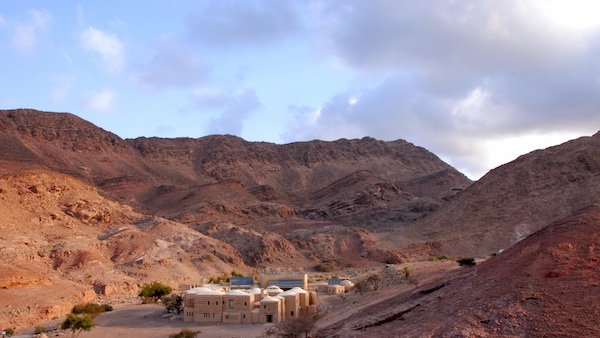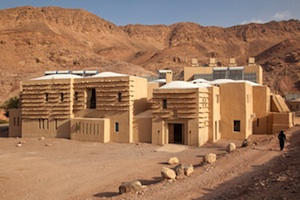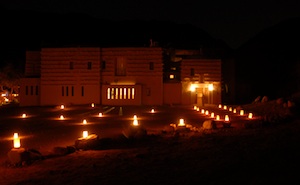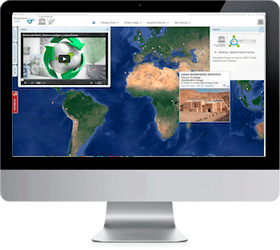A model of sustainable hotel in Dana biosphere reserve
Feynan Ecolodge lies in the Dana Biosphere Reserve, the largest reserve in Jordan covering 320 km2 of land. Dana is an area of tremendous biodiversity and importance in terms of wildlife, geology and landscape. It is the only reserve in Jordan that encompasses the four different bio-geographical zones of the country: Mediterranean, Irano-Turanian, Saharo-Arabian and Sudanian.
Feynan Ecolodge is a first for ecotourism in Jordan. Owned by the Royal Society for the Conservation of Nature (RSCN) and operated by EcoHotels (a Jordanian start up), Feynan Ecolodge integrates conservation and socio-economic development whilst having a minimal impact on the environment and offering a unique tourism experience. Feynan Ecolodge has garnered international recognition, receiving a number of awards including being listed as one of National Geographic’s top 25 ecolodges in the world in 2013.
A lodge based on energy sustainability
Feynan Ecolodge is completely off grid. What little electricity is consumed is generated through solar photovoltaic (PV) panels. Batteries store 50kWh, enabling the lodge to store 3 days’ worth of electricity to account for cloudy days.
In order to efficiently utilize the energy generated, usage is kept to a minimum and closely monitored. Only essential electrical appliances are used, and those employed are certified to use very low amounts of energy. The kitchen, guest bathrooms and office are the only areas with electric lighting and use CFL 8W bulbs. Appliances such as the refrigerators in the kitchen are Energy Star (US rating) or A/A+ (EU rating) certified. Laundry is air dried, reducing the need for energy consuming driers and towels are changed on request rather than every day. As a result the lodge uses less electricity than a typical two bedroom apartment in Jordan’s capital, Amman.
At night, the lodge is lit by candlelight providing an innovative solution and drawing on traditional techniques. Candles made onsite by local Bedouin women are positioned in carved niches throughout the lodge and in guests’ rooms giving light, an enchanting ambience and allowing guests to view the beautiful night sky.
Hot water needs at Feynan are also met by solar power. An extensive solar heating system provides all necessary hot water for the kitchen, guests, and washing machines (the washing machines do not heat water electrically).
Due to warm climate at Feynan, space heating is only required for a short part of the year. For 60-90 evenings each winter, waste from olive pressing known as jift in Arabic, or olive pit charcoal, is burned in the two fireplaces at the lodge to provide heat. This preserves Jordan’s trees and utilizes a renewable source of energy that is a natural by-product of Jordan’s annual olive harvest.
The ecolodge was designed following bioclimatic criteria. A well conceived design provides the lodge with an integral courtyard linked to outer patios providing soft breezes and shady spots to rest. Perpendicular outcrops on the lodge’s facades provide shade on outer surfaces and aesthetically appealing contrasts.
Integrated in the community and the environment
The vision of Feynan is to operate in complete harmony with its environment. From the local staff, to the design of the lodge and its rooms, to its environmen-tally friendly policies, Feynan embodies sustainability whilst offering guests a unique experience. Feynan also directly contributes to conservation as a sizable proportion of revenue goes to the RSCN for investment in programmes to preserve the natural environment in the Dana Biosphere Reserve.
Feynan’s approach to energy is just one part of its environmental strategy. Water use and waste are minimised. Only minimal amounts of paper and plastic are used and residual waste is recycled if possible. Food waste is transformed into fertiliser through on-site composting. Disposable plastic PET water bottles have been eliminated from guest rooms and replaced by locally produced clay water jars, saving 8,000 – 10,000 bottles from the environmental annually. Overall Feynan has reduced the amount of waste going to landfill by 60% since 2009.
In line with EcoHotels’s mission and the Royal Society for the Conservation of Nature’s (RSCN) policies to employ staff from local areas and communities, Feynan Ecolodge has an entirely local team working onsite. In addition, the candle-making and leather workshops on site give women in the community the opportunity to work to help support their families and showcase their art. Local businesses provide supplies for the lodge and all revenue generated from transportation to and from the lodge goes directly to the drivers from the local Bedouin community. In total the lodge provides direct benefits to over 80 local families which equates to 400 people or 14% of the local population.
Lessons learned and replicability
The experience of Faynan Ecolodge shows how an intelligent use of renewable energy sources not only helps the environment and solves the scarcity of resources, but it is also an added value to the tourism experience. The adoption of clean energy solutions and energy responsible behaviours becomes an at-traction and a sign of identity rather than a problem.
Feynan model is a replicable experience in many isolated tourist destinations in the UNESCO sites. The development of the self-sufficient Ecolodge concept by integrating local cultural and environmental values is an excellent way to improve the tourist activity in the sites.

© Feynan Ecolodge Photo Escape. Dana biosphere reserve, Jordan.

















